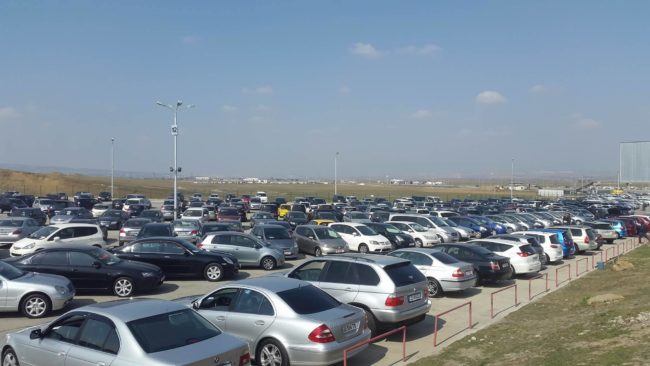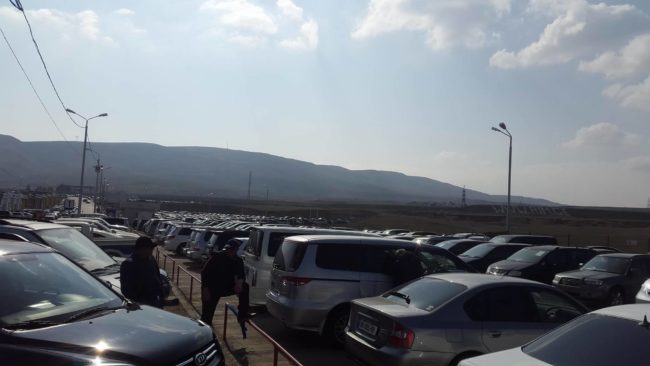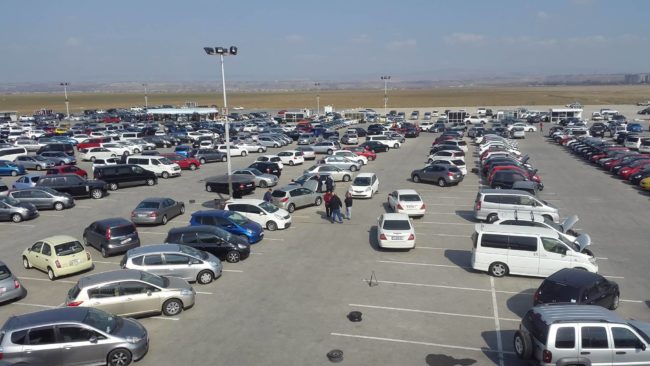

 Georgia used to be a regional hub for importing and then re-exporting used cars across the Caucasus and Central Asia. Import tariffs from the Russian-led Eurasian Economic Union as well as regulations on older and right-hand drive cars have stripped the car markets of Rustavi of this valuable trade.
Georgia used to be a regional hub for importing and then re-exporting used cars across the Caucasus and Central Asia. Import tariffs from the Russian-led Eurasian Economic Union as well as regulations on older and right-hand drive cars have stripped the car markets of Rustavi of this valuable trade.
The car market in Rustavi, a city 25 km south-east of the capital Tbilisi, is the biggest of its kind in Georgia. People from around the country and from other former Soviet republics come here to buy cars. Recently, it has remained filled with cars, the majority imported from Japan. Sellers complain that sales have been falling. They believe that the state of the country’s economy is behind the slowdown, as well as restrictions on car exports from Georgia in Armenia, Azerbaijan, and Kazakhstan.
The first major blow to the market was an agreement between Russia, Belarus, and Kazakhstan to create joint economic zone, which came to force from January 2012. This dramatically increased tariffs for cars imported from third party countries — including Georgia — into members of the new Eurasian Customs Union. Export of cars to Kazakhstan, previously the top importer of cars from Georgia, abruptly stopped.
The second blow came when Azerbaijan, Georgia’s second biggest importer of cars, established new regulations prohibiting imports of cars produced before 2005. Later, excise taxes for cars produced after 2005 were also increased, further hurting Rustavi’s car market.
The third blow was Armenia’s decision to join the Eurasian Customs Union, extending tariffs on car imports to the country. Armenia was Georgia’s third biggest importer of cars.
As a result, Georgia has lost its position as the regional leader in re-exporting cars.
Georgia cracking down on cars with right-hand drive

From January 2017, a new law came into force in Georgia tripling excise duties on cars with right-hand drive. Cars sellers in Rustavi tell us that they mainly import cars from Japan, because they are relatively new, are cheap, and their only downside is that they have the steering wheel on the right.
People protested against the draft law in several Georgian cities when it was introduced to parliament.
The new law, which came to force in January, also reduced taxes on hybrid vehicles produced less than six years ago by 60% (50% for hybrids produced more than six years ago).
When OC Media met with car sellers in Rustavi, most of them avoided speaking openly with us, claiming that it won’t change anything.
One car dealer, who didn’t wish to mention his name, told us that many sellers have already decided to leave the car market, and that the situation is becoming worse every day.
‘I have been working for four years here, and this was the final straw, cars aren’t sold here anymore. No one wants to buy anything. I have only two cars left. I will try to sell them somehow and then it’s over, I won’t come here anymore’, he said.
The increased tax rates do not apply to these cars, which were imported before December 2016, but cars purchased in 2017 will have to pay the increased tax.
Dato Grigolava sells cars in Rustavi market. He thinks that the government should have regulated sales of right-hand drive cars from the beginning, and that then people would have avoided a ‘misunderstanding’.
‘Cars are becoming expensive. A car is not a luxury item anymore. It is a necessity. If a certain car costs $2,000 now, soon the same car will be more than $5,000’, he told OC Media.
Grigolava explains that cars imported from Japan have no competition, considering their price and condition. He says that 80% of Japanese cars are in the best condition.
‘I don’t consider a car imported from the US as a car. They are in terrible condition. The government doesn’t control this. They have to see the condition of those cars. They bring damaged cars from the US and it’s impossible to really fix them. They will improve their façade and then sell them. It happens a lot. Such cars should be banned’, Grigolava exclaims.
Another dealer, who also wanted to remain anonymous, told us that people began to purchase right-hand drive cars because their price is low, and people are poor. While people often don’t like right-hand drive cars, they choose to buy them since they are in good condition and are cheap.
‘We all want left-hand drive cars, but people have no money. If we used to sell 1,000 cars a month, we will sell 1 or 2 with the new tax and increased prices. Now tell me how good this is for the country’s budget’, he asks.
He says that people come from the villages to work in the city; they sell their cows, buy cars here, and work as a taxi driver.
‘Many of them sleep in these cars. They have no other choice’.
Will the market recover?

According to Georgia’s National Statistics Office, in January 2017, car imports were worth $5 million less than in the previous year.
Shalva Obgaidze, Head of the Car Federation of Georgia, says that this number is not alarming. He believes that the market will soon adapt to the new regulations, and imports will return to their previous rates.
‘People may import cars from Japan, the US, or even South Korea. Many people are trying to import cars from South Korea, the market will soon regulate this. It is a painful period of time, but we all have to go through it’, he said.
Before the new regulations, excise taxes for cars produced in 2001 were ₾1,440 ($585), this will now rise to ₾4,320 ($1,756). For cars with right-hand drive, or which have been converted from right to left-hand drive, the rate will now be ₾12,960 ($5,269).
According to World Ex, a shipping company, more than 45% of cars in Georgia are over 20 years old, with another 45% 11–20 years old. Only 10% of cars are relatively new.








